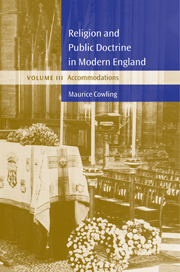Book contents
- Frontmatter
- Contents
- Foreword and acknowledgements
- Introduction
- I The Christian intellect and modern thought in modern England
- 1 The reanimation of Protestantism I
- 2 Christianity and literature I
- 3 The reanimation of Protestantism II
- 4 The enlargement of Christianity
- 5 Christianity and literature II
- 6 Christianity and modern knowledge I
- 7 Whiggism, Liberalism and Christianity I
- 8 Whiggism, Liberalism and Christianity II
- 9 Christianity and modern knowledge II
- 10 Christianity in an unfriendly world I
- 11 Christianity in an unfriendly world II
- 12 Christianity in an unfriendly world III
- 13 Christianity in an unfriendly world IV
- 14 Christianity in an unfriendly world V
- II The post-Christian consensus
- III Conclusion: religion and public doctrine in modern England
- Notes
- Index of proper names
2 - Christianity and literature I
Published online by Cambridge University Press: 23 December 2009
- Frontmatter
- Contents
- Foreword and acknowledgements
- Introduction
- I The Christian intellect and modern thought in modern England
- 1 The reanimation of Protestantism I
- 2 Christianity and literature I
- 3 The reanimation of Protestantism II
- 4 The enlargement of Christianity
- 5 Christianity and literature II
- 6 Christianity and modern knowledge I
- 7 Whiggism, Liberalism and Christianity I
- 8 Whiggism, Liberalism and Christianity II
- 9 Christianity and modern knowledge II
- 10 Christianity in an unfriendly world I
- 11 Christianity in an unfriendly world II
- 12 Christianity in an unfriendly world III
- 13 Christianity in an unfriendly world IV
- 14 Christianity in an unfriendly world V
- II The post-Christian consensus
- III Conclusion: religion and public doctrine in modern England
- Notes
- Index of proper names
Summary
When any state, as such, shall not acknowledge the existence of God as a moral governor of the world … when it shall abolish the Christian religion by a regular decree; when it shall persecute … all its ministers … with a cold, unrelenting, steady cruelty … when it shall generally shut up, or pull down, churches; when the few buildings which remain of this kind shall be opened only for the purpose of making a profane apotheosis of monsters, whose vices and crimes have no parallel amongst men, and whom all other men consider as objects of general detestation … when, in … mockery of all religion, they institute impious, blasphemous, indecent, theatrick rites, in honour of their vitiated, perverted reason, and erect altars to the personification of their own corrupted and bloody republick; when schools and seminaries are founded at publick expense to poison mankind … with the horrible maxims of this impiety; when wearied out with incessant martyrdom, and the cries of a people hungering and thirsting for religion, they permit it only as a tolerated evil … I call this atheism by establishment.
(Edmund Burke, Three Letters … on the Proposals for Peace with the Regicide Directory of France 1796–7, in The Works of the Rt. Hon. Edmund Burke, 1826, vol. VIII, pp. 170–1)Unhappy Asia, do you call it? It is the unhappiness of Europe over which I mourn.
(Benjamin Disraeli, Tancred: or The New Crusade, 1847, 1881 edn, p. 309)All the writing which deserves to be thought of as doctrinal in England in the last two hundred years deals directly or obliquely, with ‘the weightier matters of morality and religion’.
- Type
- Chapter
- Information
- Religion and Public Doctrine in Modern England , pp. 24 - 44Publisher: Cambridge University PressPrint publication year: 2001



